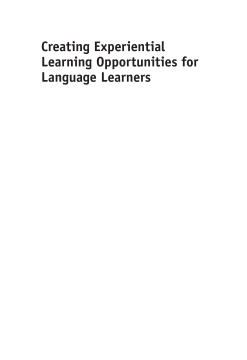
BOOK
Creating Experiential Learning Opportunities for Language Learners
Melanie Bloom | Carolyn Gascoigne
(2017)
Additional Information
Book Details
Abstract
While much research has been done on experiential learning opportunities in study abroad settings, there are fewer publications devoted to experiential learning in the domestic context. This volume aims to fill that gap by providing a collection of chapters highlighting research-based innovations in experiential learning in domestic settings. The book focuses on three experiential learning contexts: community engagement experiences, professional engagement experiences and other unique experiential contexts such as language camps and houses. The collection focuses on the US context but the research projects and curricular innovations described here can serve as models for educators working in other local contexts and will encourage interested practitioners to explore experiential learning opportunities in their local areas. It will also provide the reader with a better understanding of this growing field of inquiry and should appeal to graduate students and researchers who are interested in experiential language learning.
Through a blend of research findings, program examples, lesson plans, and survey questionnaires, the authors offer first-hand accounts of how community-based, experiential learning enhanced the goals of their language learning programs. The broad coverage of issues and topics, spanning kindergarten through higher education, make this a useful volume, not just for language educators, but for all educators interested in strengthening students’ capacities to act 'glocally' in multilingual contexts.
Melanie Bloom is Associate Professor and Chair of the Department of Foreign Languages and Literature at the University of Nebraska at Omaha, USA. Her research interests include experiential learning, study abroad, second language writing and the teaching and learning of culture.
Carolyn Gascoigne is Dean of Arts & Humanities at Angelo State University, USA. Her research interests include second language reading and hybrid language instruction.
The numerous examples of experiential learning projects...are all presented in ways that are easy to understand, adapt and implement. (The editors') recommendations about planning, implementation and reflection make this volume an essential tool in building experiential learning into a language curriculum.
Joshua Pope, Doane University, USA
This essential volume represents a seminal collection by leading scholars in experiential learning as it covers a diversity of topics and languages, divided into three critical areas of practice: community engagement experiences, professional engagement experiences and less common contexts such as language camps and houses. It is a unique contribution, which will be a welcome and useful resource to scholars, faculty and graduate students all over the world. This is certainly a 'must-have'.
This volume offers many ideas for student engagement in learning through community building for heritage speakers, students in small programs, and those wishing to break new ground. The collection of essays will be invaluable for anyone seeking ways to prepare second language learners for professional success and fulfillment.
Randi L. Polk, Eastern Kentucky University, USA
Table of Contents
| Section Title | Page | Action | Price |
|---|---|---|---|
| Contents | v | ||
| Contributors | vii | ||
| Introduction | xi | ||
| Part 1 Experiential Learning through Community Engagement | 1 | ||
| 1 Multilingual Learners and Leaders | 3 | ||
| 2 Community Engagement in Spanish Departments at US Colleges and Universities: Where Is It? | 18 | ||
| 3 Civic Engagement and Community Service Learning: Connecting Students’ Experiences to Policy and Advocacy | 33 | ||
| 4 Service Learning as an Ecological Resource: Providing Learning Opportunities for Mixed Second and Heritage Language Classrooms | 53 | ||
| 5 Experiential Learning for L2 Students: Steps Toward a French Service-Learning Program in the Community | 72 | ||
| Part 2 Experiential Learning through Professional Engagement | 91 | ||
| 6 Externship Opportunities for French: An Initial Response to Pedagogical Climate Change | 93 | ||
| 7 Developing Internship Programming for Second Language Students | 111 | ||
| 8 Mentors’ Perspectives on Professional Internships: Rewards, Challenges and Future Directions | 135 | ||
| 9 Internship Programs: A Platform for Locally-based Cultural Immersion Programs | 160 | ||
| Part 3 Experiential Learning in Other Local Contexts | 181 | ||
| 10 Using Expeditionary Learning Design for Secondary and College-Level World Language Curriculum and Instruction | 183 | ||
| 11 Creative Placemaking in Cajun Louisiana: A Multidisciplinary Approach to Teaching and Learning Environmental, Cultural and Linguistic Diversity in the United States | 205 | ||
| 12 Engaging Students through Foreign Language Campus Housing: A Case Study of a Small German Language Program | 228 | ||
| 13 Language Camps: By Teaching We Learn | 242 | ||
| Conclusion: Future Directions in Experiential Learning | 258 | ||
| Index | 264 |
